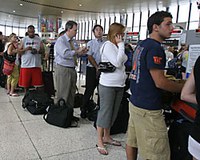Prairie Fare: Stressed-out Days Can Affect Nutrition and Health
(Click the image below to view a high-resolution image that can be downloaded)
By Julie Garden-Robinson, Food and Nutrition Specialist
NDSU Extension Service
I couldn’t help but think of the 1960s song “Mama Said There’ll Be Days Like This” the other day.
I had been on two flights earlier in the day on my way to Alaska. I arrived at my gate an hour early with only two people in line in front of me. I needed to change airlines and get my seat assignment.
I have plenty of time for a snack, I thought to myself.
I already had spent 10 hours on flights and layovers in my long journey, so I was feeling a “hunger headache” coming my way. The small packet of pretzels provided on the flight doesn’t carry me through.
The airline attendants began having problems with the computer at the gate, and about six people were working nervously at the computer terminal. Forty minutes passed. My stomach was growling and I was growing more impatient by the minute, along with the 20 people now in line behind me.
I could hear lots of heavy sighs, audible complaints and people talking about ordering pizza. I took a deep breath, did a couple of shoulder shrugs and thought about my favorite stress-relief song. I smiled thinking about the entire line of people breaking into a song and dance routine.
The minutes toward takeoff ticked by and people began boarding the plane. Finally, another attendant came over and asked for my itinerary. She left and quickly returned.
“Since this machine isn’t working, either, we’ll have to wait until everyone is seated to see if we have a seat for you,” she said.
I was hoping that the plane was “working.”
My heart began beating faster, my shoulders tensed, and I think my antiperspirant was failing quickly. Finally, the attendant wrote a seat number on my sheet and I was the last person to board the plane.
I walked somewhat triumphantly onto the plane. However, when I arrived at my seat, someone was occupying it. I was ready to crawl into the overhead luggage compartment.
Fortunately, the person discovered she was in the wrong row. The expression on my face probably gave her a clue.
Yes, I was feeling a little stressed, partly because flying isn’t my ideal pastime and partly because I really needed some food.
Stress can have many effects that might include an increased heart rate, dizziness, stomachache, headache, stiff neck, shoulder pain, irritability and many other symptoms.
A little stress can be positive. The stress of a deadline can propel you to get your job done, do your job well and get to your gate at the airport on time.
On the negative side, stress can affect your ability to concentrate, leave you feeling sad, reduce your energy level and cause sleep issues, as well as many other symptoms.
Prolonged stress can cause ongoing pain and a weakened immune system, which can lead to frequent colds and infections. Long-term stress can increase your blood pressure and affect your heart health.
Some people might turn to drinking alcohol or smoking to cope with stress, but neither of those options provides long-lasting relief from stress.
Getting some physical activity is one of the best ways to overcome stress. All of us need to try to accumulate about 30 minutes of moderate activity on five or more days of the week.
Stress can affect your eating patterns, so we need to be aware of managing and balancing our nutrition. Some people eat more than usual and others will lose their appetite in response to ongoing stress.
When I finally settled into my seat for my flight that day, I remembered I had dropped a crunchy granola bar with nuts in my bag on my way out of my home. Complex carbohydrates and magnesium-rich nuts actually are satisfying and good for combatting stress.
I rented a DVD player and watched a comedy. Laughter also helps relieve stress.
I would have preferred some warm, soft, satisfying food such as this tasty recipe that’s perfect to serve over mashed red potatoes, brown or white rice or pasta. Add some colorful steamed broccoli, baked apples and low-fat or fat-free milk for a delicious meal.
Slow Cooker Paprika Chicken
6 boneless, skinless chicken breasts
Paprika (generous amount)
1 can cream of chicken soup
1 (4-ounce) can mushrooms with liquid (optional ingredient)
1/4 c. water if using mushrooms; 1/2 c. if omitting mushrooms
Salt and pepper to taste
1 c. light sour cream or nonfat plain yogurt
Cooked rice, pasta or mashed potatoes
Place chicken in a slow cooker and sprinkle with a generous amount of paprika. Pour soup, mushrooms (if desired) and water on top of chicken. Add salt and pepper if desired. Cover slow cooker and cook on low for six to eight hours or on high for two to four hours. Add sour cream during the last 30 minutes of cooking. Serve over rice, pasta or mashed potatoes.
Makes six servings. Each serving of chicken and sauce has 190 calories, 3.5 grams (g) of fat, 9 g of carbohydrate, 1 g of fiber and 350 milligrams of sodium.
(Julie Garden-Robinson, Ph.D., R.D., L.R.D., is a North Dakota State University Extension Service food and nutrition specialist and professor in the Department of Health, Nutrition and Exercise Sciences.)
NDSU Agriculture Communication – Sept. 18, 2014
| Source: | Julie Garden-Robinson, (701) 231-7187, julie.garden-robinson@ndsu.edu |
|---|---|
| Editor: | Rich Mattern, (701) 231-6136, richard.mattern@ndsu.edu |


